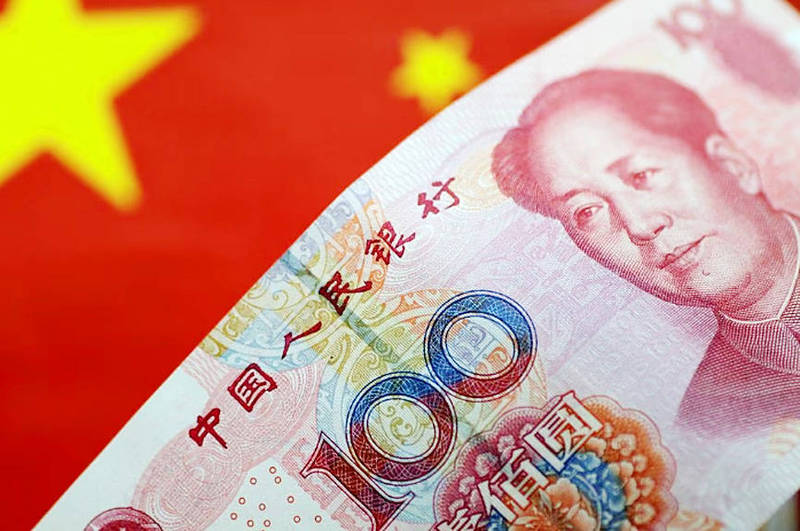《TAIPEI TIMES》 Data at risk at China job events: experts

A Chinese yuan banknote is displayed above the Chinese national flag on May 31, 2017. Photo: Reuters
ELECTION ENGINEERING: Beijing could use personal information it has collected to more precisely deliver targeted disinformation to Taiwanese, an academic said
By Chung Li-hua / Staff reporter
The Chinese government could be collecting personal data from young Taiwanese at job recruitment events, and might use that data as part of its “united front” tactics to influence the January elections, academics said.
Unemployment among people aged 16 to 24 in China’s urban areas reached a record high of 21.3 percent last month, but the Chinese government continues its “preferential” internship and employment policies for young Taiwanese.
The Cross-strait Youth Internship, Employment and Entrepreneurship Forum was held in China’s Jiangsu Province on Friday.
It claimed to be offering more than 1,000 intern positions or jobs to young people. Upon entry at the event, Taiwanese jobseekers were required to register their name, telephone number, identification number and other personal information for “identity authentication.”
Taipei University of Marine Technology assistant professor Wu Chien-chung (吳建忠) on Saturday said that people who apply for the Mainland Travel Permit for Taiwan Residents (台灣人民來往大陸通行證) — commonly referred to as a Taiwan compatriot permit (台胞證) — were also required to fill in their identification number at the event.
Beijing has long been collecting personal data from Taiwanese, and data from the household registration system and National Health Insurance system have been hacked and sold to China, he said, adding that it is not surprising that Beijing can build up a database to use for identity authentication.
Beijing could also use the collected personal information for data analysis to deliver disinformation more precisely to a targeted audience in Taiwan as part of its cognitive warfare campaign against the nation, he said.
Cross-Strait Policy Association researcher Wu Se-chih (吳瑟致) said that ahead of Taiwan’s presidential election in January next year, the Chinese Communist Party has been collecting personal information from young Taiwanese, and using digital technology and big data analysis to launch a series of cognitive warfare campaigns targeted at those “with demands.”
“First build relationships, then launch ‘united front’ campaigns,” Wu Chien-chung said, adding that China’s annual Straits Forum often attracts thousands of people, and many Taiwanese participants join chat groups on messaging apps such as Line or WeChat, from which they would continue to receive messages aimed to influence their thoughts.
Beijing’s “united front” tactics also include audience segmentation, which involves influencing different groups of people with precision using different methods, such as a Taiwanese diabolo instructor who was recently detained on suspicion of recruiting military officers and seeking military intelligence for China, he said.
Wu Se-chih said that Beijing’s “united front” campaigns aimed at young Taiwanese were temporarily suspended during the COVID-19 pandemic, so it is holding many cross-strait youth exchange events this summer, including the Cross-strait Youth Forum and the Taiwan Youth Compatriots Thousand-People Summer Camp.
Beijing is trying to stress the legitimacy of peaceful cross-strait development through frequent exchanges, to hide its ambition of annexing Taiwan using military force, he said.
As China has a high youth unemployment rate, offering job opportunities to young Taiwanese might result in a backlash from the public, so cross-strait exchanges under such circumstances are not only meaningless, but might increase the risks young Taiwanese could face in China, Wu Se-chih said.
新聞來源:TAIPEI TIMES














